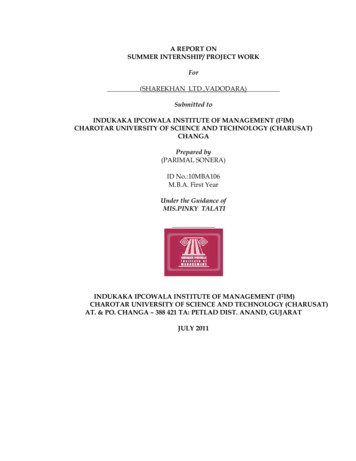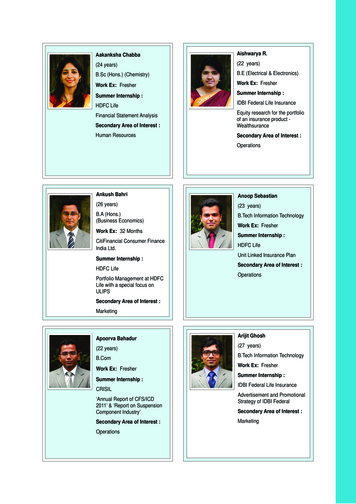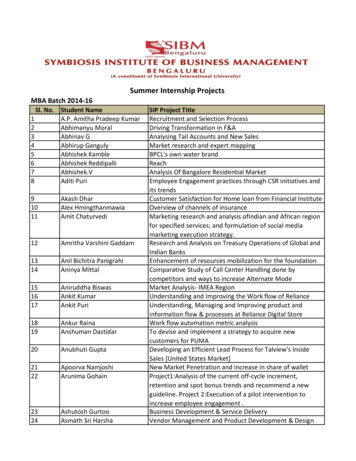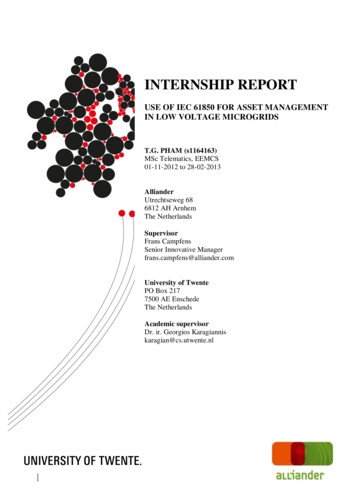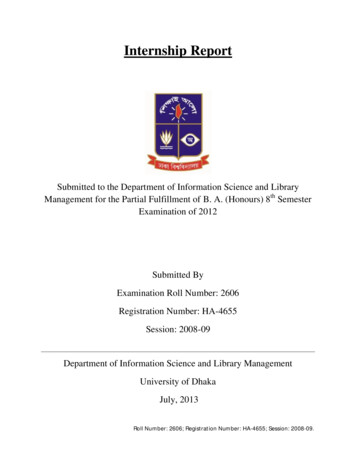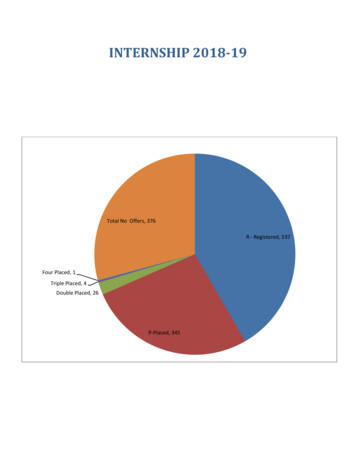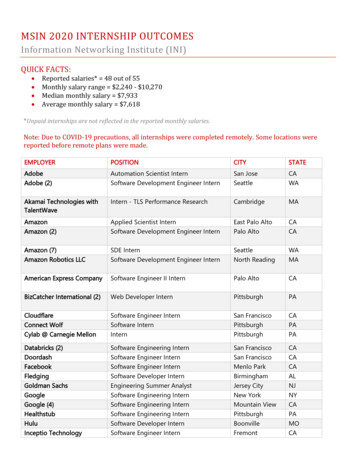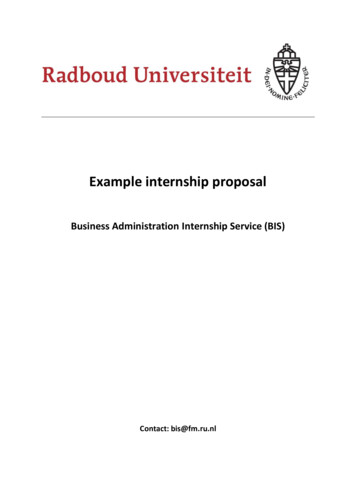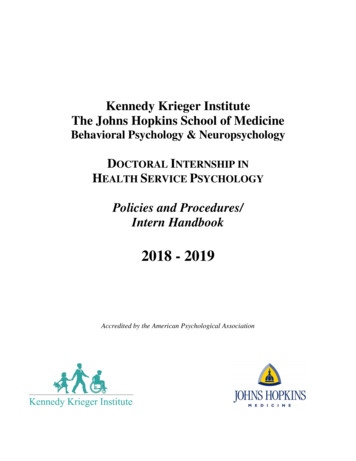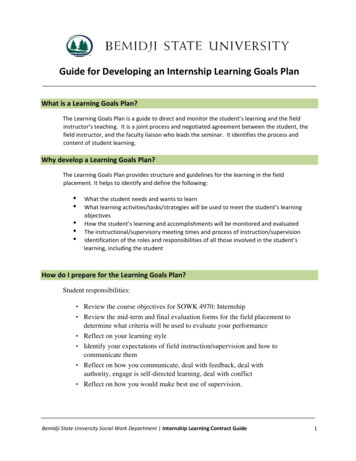
Transcription
Guide for Developing an Internship Learning Goals PlanWhat is a Learning Goals Plan?The Learning Goals Plan is a guide to direct and monitor the student’s learning and the fieldinstructor’s teaching. It is a joint process and negotiated agreement between the student, thefield instructor, and the faculty liaison who leads the seminar. It identifies the process andcontent of student learning.Why develop a Learning Goals Plan?The Learning Goals Plan provides structure and guidelines for the learning in the fieldplacement. It helps to identify and define the following:What the student needs and wants to learnWhat learning activities/tasks/strategies will be used to meet the student’s learningobjectivesHow the student’s learning and accomplishments will be monitored and evaluatedThe instructional/supervisory meeting times and process of instruction/supervisionIdentification of the roles and responsibilities of all those involved in the student’slearning, including the studentHow do I prepare for the Learning Goals Plan?Student responsibilities:Review the course objectives for SOWK 4970: InternshipReview the mid-term and final evaluation forms for the field placement todetermine what criteria will be used to evaluate your performanceReflect on your learning styleIdentify your expectations of field instruction/supervision and how tocommunicate themReflect on how you communicate, deal with feedback, deal withauthority, engage is self-directed learning, deal with conflictReflect on how you would make best use of supervision.Bemidji State University Social Work Department Internship Learning Contract Guide1
Field Instructor’s responsibilities:Review the course objectives for SOWK 4970Review the BSU expectations for field instructors and field settingsIdentify what learning opportunities exist in the field settingIdentify and prepare colleagues who may be involved in the fieldinstruction activities Reflect on personal expectations of the student andof yourselfReflect on your teaching style and how you will communicate this to thestudent Reflect on your ability to negotiateGeneral Purpose of the Learning Goals PlanA “roadmap” for the development of the internship experience.An opportunity for the student and field instructor to discuss expectations,individual learning and teaching styles, strengths and challenges, how tomanage conflictDetermines structure of supervisory sessions such as dates and times,length of sessions and who will determine agendaPlacement hours, who keeps record, what to do if unable to attendplacement, etc.ConsiderationsThere is considerable anxiety associated with this processLearning plans are negotiated; sometimes there are restrictions on whatactivities are appropriate for studentsThe field instructor must be mindful of the power dynamics Learningplans are evolving and should be renegotiated.Learning Goals Plan Objectives1) Student’s Learning ObjectivesA learning objective is a statement of what needs to be learned. Students should identifylearning objectives that are specific, doable and realistic within the period of the fieldplacement so the student and the field instructor can identify when it has been met. Theobjectives should be clear and measurable.2) Plan of Achieving Learning Objectives:Bemidji State University Social Work DepartmentInternship Learning Contract
This is a plan/strategy to meet a specific learning objective. It should be realistic and includewhat learning opportunities are available at the agency setting. The tasks are negotiated basedon the skill level of the student and the field instructor. Dates can be assigned for completionof the tasks.a) Learning opportunities that will be available and how will they be structuredb) What client, tasks or project assignments can the student be involved with?c) Learning opportunities should be relevant to the student’s learningField instructors should be actively involved in developing this section because of theirknowledge of resources of the agency and the range of learning opportunities available to thestudent.3) Identify how you will evaluate and monitor if you have met your learning objectives.The Learning Goals Plan is meant to give the student and the field instructor a sense ofaccomplishment. Evaluation procedures should include how the student will be evaluated andwho will be consulted. Evaluation can occur through the following methods:Direct PracticeObservations, audio tapes, meetings, consultation, role plays,presentations, debriefings, weekly uninterrupted supervision meetingsSelf-reflective documentation, willingness to be observedIndirect PracticeProcess recordings, summary recordings, journals or reflective logsDocumentationReview and or preparation of documents prepared in practice such asletters, minutes, assessments, briefs, proposals, reports, agency statistics,user satisfaction indicators used by the agencyBemidji State University Social Work DepartmentInternship Learning Contract
Guidelines for Learning ObjectivesStudents are required to develop three learning objectives for each of the nine competencies inthe Learning Goals Plan. Below, are guidelines designed to aid students in creating clear andmeasurable learning objectives for each of the nine competencies.Competency 1: Demonstrate Ethical and Professional BehaviorSocial workers understand the value base of the profession and its ethical standards, as well asrelevant laws and regulations that may impact practice at the micro, mezzo, and macro levels.Social workers understand frameworks of ethical decision-making and how to apply principlesof critical thinking to those frameworks in practice, research, and policy arenas. Social workersrecognize personal values and the distinction between personal and professional values. Theyalso understand how their personal experiences and affective reactions influence theirprofessional judgment and behavior. Social workers understand the profession’s history, itsmission, and the roles and responsibilities of the profession. Social Workers also understandthe role of other professions when engaged in inter-professional teams. Social workersrecognize the importance of life-long learning and are committed to continually updating theirskills to ensure they are relevant and effective. Social workers also understand emerging formsof technology and the ethical use of technology in social work practice. Social workers:make ethical decisions by applying the standards of the NASW Code of Ethics,relevant laws and regulations, models for ethical decision-making, ethical conductof research, and additional codes of ethics as appropriate to context;use reflection and self-regulation to manage personal values and maintainprofessionalism in practice situations;demonstrate professional demeanor in behavior; appearance; and oral, written,and electronic communication;use technology ethically and appropriately to facilitate practice outcomes; anduse supervision and consultation to guide professional judgment and behavior.Competency 2: Engage Diversity and Difference in PracticeSocial workers understand how diversity and difference characterize and shape the human experience and arecritical to the formation of identity. The dimensions of diversity are understood as the intersectionality of multiplefactors including but not limited to age, class, color, culture, disability and ability, ethnicity, gender, genderidentity and expression, immigration status, marital status, political ideology, race, religion/spirituality, sex, sexualorientation, and tribal sovereign status. Social workers understand that, as a consequence of difference, aperson’s life experiences may include oppression, poverty, marginalization, and alienation as well as privilege,power, and acclaim. Social workers also understand the forms and mechanisms of oppression and discriminationand recognize the extent to which a culture’s structures and values, including social, economic, political, andcultural exclusions, may oppress, marginalize, alienate, or create privilege and power. Social workers:Bemidji State University Social Work DepartmentLearning Contract Guide April 2017
apply and communicate understanding of the importance of diversity anddifference in shaping life experiences in practice at the micro, mezzo, and macrolevels;present themselves as learners and engage clients and constituencies as experts oftheir own experiences; andapply self-awareness and self-regulation to manage the influence of personalbiases and values in working with diverse clients and constituencies.Competency 3: Advance Human Rights and Social, Economic, and Environmental JusticeSocial workers understand that every person regardless of position in society has fundamental human rights suchas freedom, safety, privacy, an adequate standard of living, health care, and education. Social workers understandthe global interconnections of oppression and human rights violations, and are knowledgeable about theories ofhuman need and social justice and strategies to promote social and economic justice and human rights. Socialworkers understand strategies designed to eliminate oppressive structural barriers to ensure that social goods,rights, and responsibilities are distributed equitably and that civil, political, environmental, economic, social, andcultural human rights are protected. Social workers:apply their understanding of social, economic, and environmental justice toadvocate for human rights at the individual and system levels; andengage in practices that advance social, economic, and environmental justice.Competency 4: Engage In Practice-informed Research and Research-informed PracticeSocial workers understand quantitative and qualitative research methods and their respective roles in advancing ascience of social work and in evaluating their practice. Social workers know the principles of logic, scientificinquiry, and culturally informed and ethical approaches to building knowledge. Social workers understand thatevidence that informs practice derives from multi-disciplinary sources and multiple ways of knowing. They alsounderstand the processes for translating research findings into effective practice. Social workers:use practice experience and theory to inform scientific inquiry and research;apply critical thinking to engage in analysis of quantitative and qualitativeresearch methods and research findings; anduse and translate research evidence to inform and improve practice, policy, andservice delivery.Competency 5: Engage in Policy PracticeSocial workers understand that human rights and social justice, as well as social welfare and services, aremediated by policy and its implementation at the federal, state, and local levels. Social workers understand thehistory and current structures of social policies and services, the role of policy in service delivery, and the role ofpractice in policy development. Social workers understand their role in policy development and implementationwithin their practice settings at the micro, mezzo, and macro levels and they actively engage in policy practice toeffect change within those settings. Social workers recognize and understand the historical, social, cultural,economic, organizational, environmental, and global influences that affect social policy. They are alsoknowledgeable about policy formulation, analysis, implementation, and evaluation. Social workers:Bemidji State University Social Work DepartmentLearning Contract Guide April 2017
identify social policy at the local, state, and federal level that impacts well-being,service delivery, and access to social services;assess how social welfare and economic policies impact the delivery of and accessto social services;apply critical thinking to analyze, formulate, and advocate for policies thatadvance human rights and social, economic, and environmental justice.Competency 6: Engage with Individuals, Families, Groups, Organizations, and CommunitiesSocial workers understand that engagement is an ongoing component of the dynamic and interactive process ofsocial work practice with, and on behalf of, diverse individuals, families, groups, organizations, and communities.Social workers value the importance of human relationships. Social workers understand theories of humanbehavior and the social environment, and critically evaluate and apply this knowledge to facilitate engagementwith clients and constituencies, including individuals, families, groups, organizations, and communities. Socialworkers understand strategies to engage diverse clients and constituencies to advance practice effectiveness.Competency 7: Assess Individuals, Families, Groups, Organizations, and CommunitiesSocial workers understand that assessment is an ongoing component of the dynamic and interactive process ofsocial work practice with, and on behalf of, diverse individuals, families, groups, organizations, and communities.Social workers understand theories of human behavior and the social environment, and critically evaluate andapply this knowledge in the assessment of diverse clients and constituencies, including individuals, families,groups, organizations, and communities. Social workers understand methods of assessment with diverse clientsand constituencies to advance practice effectiveness. Social workers recognize the implications of the largerpractice context in the assessment process and value the importance of inter-professional collaboration in thisprocess. Social workers understand how their personal experiences and affective reactions may affect theirassessment and decision-making. Social workers:collect and organize data, and apply critical thinking to interpret information fromclients and constituencies;apply knowledge of human behavior and the social environment, person-inenvironment, and other multidisciplinary theoretical frameworks in the analysis ofassessment data from clients and constituencies;develop mutually agreed-on intervention goals and objectives based on the criticalassessment of strengths, needs, and challenges within clients and constituencies;andselect appropriate intervention strategies based on the assessment, researchknowledge, and values and preferences of clients and constituencies.Competency 8: Intervene with Individuals, Families, Groups, Organizations, andCommunitiesSocial workers understand that intervention is an ongoing component of the dynamic and interactive process ofsocial work practice with, and on behalf of, diverse individuals, families, groups, organizations, and communities.Social workers are knowledgeable about evidence-informed interventions to achieve the goals of clients andconstituencies, including individuals, families, groups, organizations, and communities. Social workers understandtheories of human behavior and the social environment, and critically evaluate and apply this knowledge toeffectively intervene with clients and constituencies. Social workers understand methods of identifying, analyzingBemidji State University Social Work DepartmentLearning Contract Guide April 2017
and implementing evidence-informed interventions to achieve client and constituency goals. Social workers valuethe importance of interprofessional teamwork and communication in interventions, recognizing that beneficialoutcomes may require interdisciplinary, interprofessional, and inter-organizational collaboration. Social workers:critically choose and implement interventions to achieve practice goals andenhance capacities of clients and constituencies;apply knowledge of human behavior and the social environment, person-inenvironment, and other multidisciplinary theoretical frameworks in interventionswith clients and constituencies;use inter-professional collaboration as appropriate to achieve beneficial practiceoutcomes;negotiate, mediate, and advocate with and on behalf of diverse clients andconstituencies; andfacilitate effective transitions and endings that advance mutually agreed-on goals.Competency 9: Evaluate Practice with Individuals, Families, Groups, Organizations, andCommunitiesSocial workers understand that evaluation is an ongoing component of the dynamic and interactive process ofsocial work practice with, and on behalf of, diverse individuals, families, groups, organizations and communities.Social workers recognize the importance of evaluating processes and outcomes to advance practice, policy, andservice delivery effectiveness. Social workers understand theories of human behavior and the social environment,and critically evaluate and apply this knowledge in evaluating outcomes. Social workers understand qualitativeand quantitative methods for evaluating outcomes and practice effectiveness. Social workers:select and use appropriate methods for evaluation of outcomes;apply knowledge of human behavior and the social environment, person-inenvironment, and other multidisciplinary theoretical frameworks in the evaluationof outcomes;critically analyze, monitor, and evaluate intervention and program processes andoutcomes; andapply evaluation findings to improve practice effectiveness at the micro, mezzo,and macro levels.Bemidji State University Social Work DepartmentLearning Contract Guide April 2017
EXAMPLESSample tasks and activities are provided below to help you in developing a thoughtful, obtainable, and strategic Learning Goals Plan with yourintern.Learning Goals PlanLearning Objectives: What do you want to learn?Examples of ways you may identifyyour learning objectives: Gain competence in Increase knowledge of Improve in Develop skills in Deepen knowledge/awarenessof Learn about Discover Become familiar with Explore What learning activities and tasks will youengage in at the agency to reach your learningobjectives?Examples of activities/tasks youmay engage in to learn yourobjectives:How will you measure what you havelearned?Examples of ways you maymeasure your learning process: Individual and group contactResearchCase conferencesShadowing and observingCommunity visitsAttend meetingsDocumentationReadSupervision Individual, uninterruptedweeklysupervisionRole t of documentsSelf-reflectivedocumentationWillingness to be observedProvide readings andresources
Bemidji State UniversityInternship Learning Goals Plan GuideSample Intern Tasks by Social Work CompetencyCompetency 1: Demonstrate Ethical and Professional Behavior1.11.21.31.41.5Practice BehaviorsMake ethical decisions byapplying the standards of theNASW Code of Ethics,relevant laws and regulationsmodels for ethical decisionmaking, ethical conduct ofresearch, and additionalcodes of ethics asappropriate to context.Use reflection and selfregulation to managepersonal values and maintainprofessionalism in practicesituations.Demonstrate professionaldemeanor in behavior andappearance; as well as oral,written, and electroniccommunication.Use technology ethically andappropriately to facilitatepractice outcomes.Use supervision andconsultation to guideprofessional judgment andbehavior.SAMPLE Tasks/ActivitiesShow knowledge of social work principles, values,and ethics to guide behaviorDemonstrate the effective use and integration ofsocial work values and ethics to guide behaviorUnderstand how personal principles, values, andethics influence policy Engage in agency orientation and trainingincluding staff meetings, tour of agencyfacility, and introductions to staff. Distinguish the social work perspective fromthe perspectives of other professionalapproaches.Establish and adhere to a plan for supervisionincluding setting a regular supervisionschedule and utilizing supervisionappropriately. Prepare a weekly agenda forsupervision meetings. Assess and address own personal biases asthey relate to professional practice. Read the organizational chart, read thepersonnel manual, and agency budget anddiscuss with field instructor. Describe the agency struct
Bemidji State University Social Work Department Internship Learning Contract This is a plan/strategy to meet a specific learning objective. It should be realistic and include what learning opportunities are available at the agency setting. The tasks are negotiated based on


